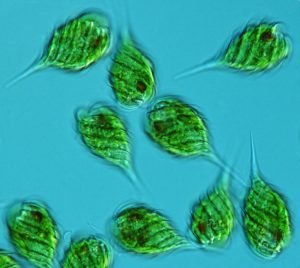Talk Title: Biology’s ‘dark matter’ – eukaryotic microbes
Dr Anna Karnkowska
Date: Wednesday, 10.05.2017, 13:00, Cent Lecture Theatre 0142
University of British Columbia, Canada (Post-Doc) & now back to Faculty of Biology, University of Warsaw, Poland
 Abstract. Our view of biology is very much biased towards what we can see with the naked eye – plants, animals, and fungi. We are also aware of prokaryotic life living on and around us. However, in between the prokaryotes and the animals, plants, and fungi is an enormous, mostly hidden biological diversity — the protists, single-celled eukaryotes. More than 95% of described eukaryotic species are animals, plants, and fungi. But this is only a small fraction of the estimated diversity of eukaryotic life. The rest of the tree comprises mostly microbial eukaryotes. Some of these organisms are of interest to medicine because they cause disease but recently we understand more the important functions protists play in food webs and biogeochemical cycles. Studies on protists also help to understand better the eukaryotic cell evolution because many differ from the standard eukaryotic cells. An important defining feature of the eukaryotic cell is its organelles, and research on protists has been essential for our understanding of organelle evolution. The origin, evolution, and loss of those organelles have been intensively studied in various groups of microbial eukaryotes and helped to understand endosymbiosis.
Abstract. Our view of biology is very much biased towards what we can see with the naked eye – plants, animals, and fungi. We are also aware of prokaryotic life living on and around us. However, in between the prokaryotes and the animals, plants, and fungi is an enormous, mostly hidden biological diversity — the protists, single-celled eukaryotes. More than 95% of described eukaryotic species are animals, plants, and fungi. But this is only a small fraction of the estimated diversity of eukaryotic life. The rest of the tree comprises mostly microbial eukaryotes. Some of these organisms are of interest to medicine because they cause disease but recently we understand more the important functions protists play in food webs and biogeochemical cycles. Studies on protists also help to understand better the eukaryotic cell evolution because many differ from the standard eukaryotic cells. An important defining feature of the eukaryotic cell is its organelles, and research on protists has been essential for our understanding of organelle evolution. The origin, evolution, and loss of those organelles have been intensively studied in various groups of microbial eukaryotes and helped to understand endosymbiosis.
I will present some of the results from the projects I have been involved and complement them by examples depicting the importance of evolutionary and ecological research on microbial eukaryotes.